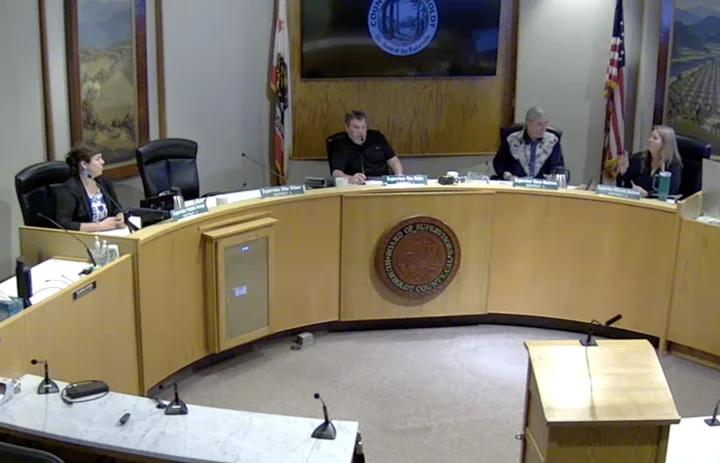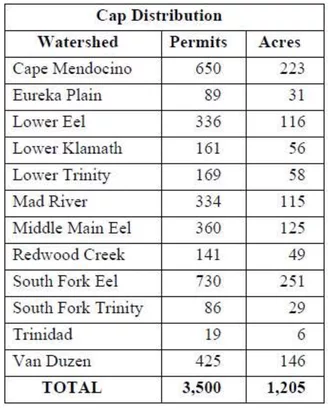Screenshot of Tuesday’s Humboldt County Board of Supervisors meeting.
###
At Tuesday’s meeting, the Humboldt County Board of Supervisors received an update on the status of the county’s commercial cannabis permitting program and ongoing efforts to monitor the industry’s impact on local watersheds.
To no one’s surprise, the county has seen “an overall decline in the number of properties that are being cultivated” in recent years, said Planning and Building Director John Ford. To date, the county has received 2,125 cultivation applications, about half of which – 1,068 – have been approved and are being monitored by staff. Of the remaining 1,057 permit applications, 400 are still being processed and 657 have been denied.
Ford noted that the number of active cultivation permits is still well below the 3,500 cap imposed by Resolution 18-43, which was adopted by the Board of Supervisors in 2018 as a part of the county’s Commercial Cannabis Land Use Ordinance, also known as Ordinance 2.0. The resolution established a permit cap for each of the county’s primary watersheds and certain sub-watersheds to prevent adverse impacts to water quality and fisheries.
When the resolution was adopted, the county was expecting an onslaught of new permit applications, Ford said. “At the time, there was concern that we would see a repeat of [Ordinance] 1.0 when over 2,000 applications were submitted [to the county] in 2016,” he said. “[Staff] wanted to make sure that there was an understanding that this wasn’t just going to continue to expand at that rate.”
However, the opposite happened. In the years following legalization, the price of cannabis plummeted due to massive overproduction across the state, pushing hundreds of local farmers into debt and forcing many others to call it quits.
“We’re not seeing new applications come in,” Ford said. “I think there may have been five [new applications submitted] in the last two years. … We believe that there isn’t anything that’s pressing or anything that needs to be done right now to address the [current] circumstances.”
Ford acknowledged some of the concerns brought forth by the proponents of Measure A, also known as the Humboldt Cannabis Reform Initiative, which sought to restrict commercial cannabis cultivation through a host of strict rules. The ballot measure was rejected in a landslide vote.
“There were some comments that were made [regarding] the possibility of an [Ordinance] 3.0 … in terms of reducing the [permit] cap,” Ford said, adding that the board could refrain from any action on the item. “[I] just wanted to bring that up. Not that we’re looking to do that, but just in case the board is looking to pursue those [options].”
During public comment, more than a dozen local cannabis farmers urged the board to refrain from further action. Craig Johnson, owner of Alpenglow Farms, emphasized that most local farmers are “not thinking about future expansion.”
“We’re just trying to hold the baseline,” he said. “We’re being singled out. … If you’re going to have any of these types of requirements, remove ‘cannabis’ from the document and just make it a county-wide document. If you’re talking culverts, talk about culverts from the bay up into the mountains, every county road, but don’t talk about mine because mine are done.”
Ross Gordon, policy director for the Humboldt County Growers Alliance, credited Ford for providing an accurate picture of the state of the local cannabis industry but echoed the previous speaker’s request for equitable treatment.
“If we’re talking about assessing environmental impacts associated with cannabis, we should also assess [the] environmental impacts of all activities within the county, whether it’s land use activities, residential activities, industrial, commercial [or] agricultural,” he said. “It has been frustrating at times to be here and have continued conversations only about licensed cannabis cultivation when we know that there are a variety of things affecting our environment and all of those things need to be considered collectively.”
Scott Bauer, a senior environmental scientist with the California Department of Fish and Wildlife, advocated for increased monitoring of local watersheds but acknowledged that the proliferation of new cannabis farms wasn’t really a present issue.
“I’ll be the first to admit it – I think the agencies and the county [hasn’t] done enough of that,” he said. “What I mean is looking at localized impacts. Let’s say Larabee Valley, which is filled with wells, right? We’re concerned about summer steelhead downstream and there are only about 100 left in the Van Duzen River. How are those wells drawing on those flows that … provide that cold water for steelhead? We should try and figure out those issues.”
Supervisor Michelle Bushnell said it was unfortunate that cannabis farmers felt singled out because “every industry is struggling in Humboldt County.”
“This conversation coming up again, targeting cultivation permitting again, it feels very attackative – if that’s the right word – to the cultivation community,” she said. “I hope that we maybe can do the monitoring that’s required and put this at rest for once and all and move forward. And hopefully, our cultivators that are remaining can be successful, because when they’re successful our county is successful and our community is successful.”
Bushnell noted that the number of farmers could drop off significantly in the next year if folks aren’t able to pay back Measure S taxes by March of 2025. “We have a lot of payment plans that are going on with Measure S,” she said. “If they don’t complete those [payments] then that’s going to be a revocation of their permit.”
After a bit of additional discussion among board members, Bushnell made a motion to receive and file the report and asked Ford to bring back more information in a year. The action was seconded by Supervisor Arroyo and approved in a 4-0 vote, with Supervisor Mike Wilson absent.
###
Other notable bits from Tuesday’s meeting:
- The board unanimously voted to revoke a conditional use permit for Hwy 36 Farms, LLC, a “nuisance” cannabis farm near Bridgeville that has been out of compliance with county and state rules for the last two years. During a site inspection in April 2022, county staff found litter throughout the property, cultivation occurring in unpermitted areas, and water use from an unknown source. The permit holder did not respond to the allegations during the public hearing.
- The board also approved a Memorandum of Understanding (MOU) between the Humboldt County Economic Development Department and partner agencies for the new WindLINK program. The program is a partnership between the county, Redwood Region Economic Development Commission (RREDC), Redwood Coast Chamber Foundation, Greater Eureka Chamber of Commerce, Northern California Small Business Development Center and NorCal APEX Accelerator. The new partnership aims to bolster economic development in the county, as it relates to the emerging offshore wind industry.


CLICK TO MANAGE